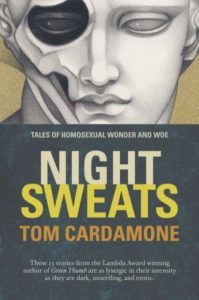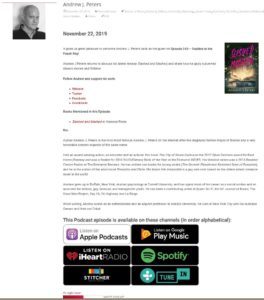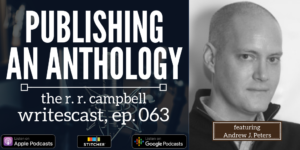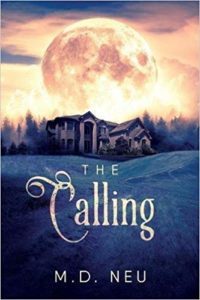Andrew J. Peters's Blog
June 17, 2020
A Long Overdue Hello

I came by to approve a comment on one of my old posts, and I was slightly horrified to notice I hadn’t made a peep around here since last year. This is my first post of 2020. Happy New Year! Happy Valentine’s Day! Hoping you had a great Oscars Party!
Ugh. I’ve been a terrible correspondent. Where do I begin to explain? I can’t blame everything on the world going bust with Covid-19 and the continuous trauma of our times here in the United States, or the stress of quarantine-living and working from home. Those things had an impact on my writing productivity for sure, but the truth is I mentally stepped away from being author Andrew J. Peters months before any of that. The reasons felt too personal and in some parts too much of a downer to share publicly.
But [deep breath] I’m going to take a dive into what’s been going on with me.
I’ve always been the sort of person who prefers to get the bad or I should say harder news out of the way first, so let’s start with that. 2019 was a tough year for me as a writer. Some great things happened, like seeing my short story anthology make its way into print, but I’d been struggling with the angsty realities of being a small press author for some time. I’m searching for the right metaphor. The air ran out of the balloon? That doesn’t quite capture things because I’d been thinking long and hard about what to do with my writing career. It’s been more like an intentional pause.
I hesitated to share how I was feeling, and not just with my readers. I only told my husband and a few close friends. I worried about sounding whiny or sounding blame-y or letting down the people who helped me get to where I am. I know some writers who have publicly talked about the things I was experiencing, but still I dreaded coming out about my own struggle. The optics seemed like a disaster. Successful authors don’t complain about how hard it is to make it in the industry and admit defeat. Who wants to buy books by someone like that? It just felt counterintuitive.
I’m still not convinced I’m doing the right thing by talking about it now, but I’m at a place where that’s okay. This will be cathartic and maybe it will be of some use to other writers who might be silently feeling the same way.
When I started writing with an eye for getting published, some ten plus years back, I was really humble about it. Writing was my second career. I was a newbie with a ton to learn. I soaked up all I could about writing craft from books and blogs. I attended conferences and retreats, and I avidly participated in writers’ forums and made a lot of writing buddies. I joined critique groups and for a while co-led a group for queer writers. I was hardly a jaded victim of early success or peaking too soon.
Starting out with my short fiction, I blithely reached for the stars but gratefully ended up publishing in non-paying markets for the most part. Through a writers critique group, I learned that my first novel manuscript, which I labored over three years to write, was total crap, and I spent a year figuring out how to fix it and then another year executing that fix. Then came two years of querying agents and just about every small press that took unagented submissions. Easily, I accumulated over one hundred rejections. I had some really deep lows, but I always bounced back. I’d never been more determined to accomplish something, and I’d never worked harder on anything in my life.
As the saying goes, it just takes one yes, and wow, that yes happened with an LGBT publisher in 2012, and it included a respectable advance.
Still, I like to think I kept my head out of the clouds. Words of wisdom from writers who were further along in their careers helped. Write your next book. What’s done is done. Don’t look back. I had a lot to write. That same publisher picked up my next two books, and I placed a series with a second publisher and a different planned series with a third.
Some of my titles did all right with sales. Most barely broke triple digits, including a title that was a finalist in the Foreword INDIES. I had an agent for a while, but she couldn’t get an editor interested in my title. The disappointments always stung, but I found a way to shake them off, usually in no more than twenty-four hours. I kept focused on both improving my writing and getting better at networking and marketing. And I kept writing books.
In 2019, I had a publishing contract for a short story anthology I’d never dreamed would come to life and a novel manuscript that was getting bites from agents in just my first few queries. It felt like things were taking off.
But then, they didn’t.
Despite a shit-ton of my own promotion, the anthology debuted to crickets chirping. Meanwhile, after all those initial enthusiastic responses to my new manuscript, rejections from agents, then editors started coming in. The wheels came off. There’s another metaphor. I started asking myself: what’s the point? I don’t expect a lot from my investment of time and creative energy, but I can’t keep living completely in the red.
I don’t mean financially. I’m privileged to have a good-paying day job. With that recent manuscript, I’m pretty sure I could work my way over to a smaller publisher and find a home for it. Yet I was thoroughly demoralized by the prospect of doing that.
For what? To take another manuscript I busted my butt to write through the arduous editing and production stages just to have another title out that a handful of people will read?
This is no dis to small presses. Those folks work hard as hell and pour their lives into keeping their businesses afloat because they love books and believe there are stories that need to be shared with the world. This is me talking about me. I took an inventory of myself and decided, I just wasn’t getting enough out of publishing my work. I needed a break. I didn’t have the energy or enthusiasm to keep trying to get published and promoting myself as an author.
I fully admit I’m not the greatest at the business side of writing. I loathe self-promotion, and I’m just not a natural at it. I pushed myself to do it for years, accepting that no writer can say their job is done just because they’ve put together the best story they can write. Even the big house publishers expect their authors to do a lot the selling on their own.
But I came to a reckoning. Do I want to keep grinding to promote a book that’s going to give a publisher a bigger share of the profits? I don’t expect to get rich, and believe me, I haven’t made any of my publishers rich. It’s the lack of an emotional return on the investment that brought me to my knees. And I’m not saying I deserve more because I’m such an awesome writer. But I deserve something, and I just haven’t been getting much.
A sidebar to that reckoning is the type of stories I write, gay fiction, are always going to have a limited readership. That’s not a statement about homophobia or discrimination in publishing or among readers. It’s just what I believe to be a fact. And I’ve got no interest in writing anything different or trying to write to market (whatever the heck that means). It’s a lonely place to be.
So, I’m on a pause from being author Andrew J. Peters. Since the start of the year, I’ve done zero with my mailing list, zero social media promotion, zero with my Patreon page, and zero work on drumming up publicity. It actually has been kind of awesome.
But I know myself. I’ll come back to it sometime. Maybe writing this post is a step in that direction. I don’t know for sure.
Meanwhile, I have been writing and doing something pretty different. It started as an experiment about two years ago: self-publishing my racier work under a pen name. I never thought I’d say this, but I’m really enjoying self-publishing. Yeah, there was that twenty-four hour period when I was in tears because I blew up my website and had to completely recreate it. And I’ve had some meltdowns doing file conversions. But overall, it’s brought the joy back to my writing. I’m not raking in cash from it, but having control over production and marketing makes a big difference for me. The self-promotional work is less dreadful because I’m directly and proportionally reaping the profits. What I put in is what I get out, and the process of building a readership feels more organic. It’s the fresh start I needed.
Thus, the story behind my disappearing act has a happy ending. If you’re curious about what I’m working on, drop me a line. Only if you’re 18 and over though. It’s explicit stuff. 
December 26, 2019
My Year in Books
It’s become a tradition for me to do a year-end post about the books I read and reviewed. Goodreads helps a lot with that (though annoyingly, I couldn’t find a way to copy, share or use html code for the personalized graphic as I had in years past). Anyway, you can see my Year in Books arranged with pretty images and statistics here.
I read a total of 23 books, which is down one book from last year. That’s not too bad considering this year I spent a little more time on manuscript swaps with writing buddies. The genres fell into the following categories:
LGBTQ+ sci fi/fantasy: 13
LGBTQ+ general fiction: 4
LGBTQ+ mystery: 2
General sci fi/fantasy: 2
LGBTQ+ YA: 1
Non-fiction: 1
And I’m happy to say 95% of the LGBTQ+ titles were #OwnVoices. 
December 17, 2019
Part Two of my Pop Up Swap with Tom Cardamone
Today, my Pop Up Swap interview with Tom Cardamone continues, and we switch seats to discuss Slashed and Mashed…
TC: Andrew, I’m intrigued! Not many writers have more than one series under their belt before tackling short stories. The usual path is the reverse, so I’d like to hear about the steps that lead up to this project.
AP: I did start out as a writer in a typical fashion, submitting short stories to journals, but you’re right, I don’t have an extensive history with short fiction and anthologies, and I haven’t had a short story published in five plus years. I had pretty much stepped away from shorts in order to work on longer projects.
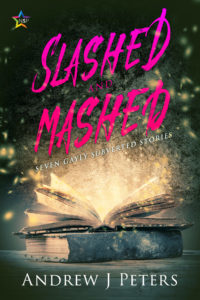 So the deal with Slashed and Mashed is I was writing content to create a Patreon page and thought it made a lot of sense to queer up some classic myths. That tends to be my fantasy métier, and I love gender-swapping and revisiting characters with a different spin.
So the deal with Slashed and Mashed is I was writing content to create a Patreon page and thought it made a lot of sense to queer up some classic myths. That tends to be my fantasy métier, and I love gender-swapping and revisiting characters with a different spin.
I ended up with a bunch of stories, and then I got more serious about them, running them by writing buddies and thinking about an anthology as a goal, whether I found a publisher or published the book myself.
I truly had no idea what my chances were getting anyone interested in publishing the collection. As you noted, I’m not known as a short story author, plus the kind of retold myths and fairytales that typically garner interest in the gay publishing world are happily-ever-after (HEA) romances, of which I had a few, but I didn’t want to limit myself to that.
So I pitched the idea to my editor Elizabetta at NineStar Press since she likes my writing and NineStar welcomes diverse fantasy and cross-genre titles, not solely focused on HEA romance and they do short story anthologies. We had a lot of back and forth about what would work best in terms of varying story length, mood, characters, and themes.
Not every piece I submitted made it into the collection. The publisher prefers “complete” stories, so the anthology leans toward longer works with start-to-finish plot arcs. I see the wisdom in that now that the book is out in the world. The fuller stories tend to get the most positive response from readers. Anyway, I’m happy with the variety in the seven pieces we included.
TC: How’d you arrive at the title?
AP: I also pitched a few possible titles to my editor, and we both liked Slashed and Mashed. I think it sums up the connective tissue. I wanted to reboot stories pretty boldly, and slashed is a nod to slash fiction, and I like that shorthand for subverting heterosexual canon.
TC: I loved the twist in the opening story, and not giving anything a way, I’m wondering if you’re a Mary Renault fan?
AP: Absolutely. I don’t read ancient world historical fiction as often these days, but there was a time when I was absorbed in it, and Mary Renault is the grand dame of ancient world historicals. I’m humbled you made that connection. With “Theseus and the Minotaur,” I wanted the story to have the feel of historical accuracy, fictional as it is. I wanted it to be a portrait of the two main characters with greater depth than the epic myth, which doesn’t really go beyond their surface characteristics and motivations.
TC: What was the first book of hers you read?
AP: Naturally, I started with The Persian Boy. I had big expectations, and that book was a case of meeting them and then some.
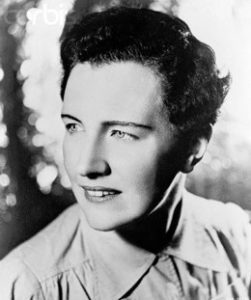
English/South African author Mary Renault. Image retrieved from Wikipedia
I’ve also read The King Must Die, The Last of the Wine, and The Charioteer. The Persian Boy remains my favorite. Renault is probably the most reliable historical storyteller in my estimation. I don’t know that for a fact, but she has such a voice and an ear and an eye for the time period, you just don’t question anything she says.
And her rendering of Alexander’s relationship with his slave Bagoas, as well as with his companion Hephaistion, feels so honest and real. They’re not heartwarming romances. I mean, there are definitely heartwarming moments, but they’re complicated as they necessarily would have been. Another thing that made me a Renault fan is the fact she took the story from Bagoas’s point-of-view, giving that lesser known historical figure the humanity he deserves.
TC: I’ve read some interesting discussions on-line about women writing gay stories, with the accusation that they’re crowding gay writers out of the market, though their audience seems to be women. I’m of the mind that this argument isn’t necessary but rather such books signify a cultural phenomenon that’s worth talking about. That said, some writers who happen to be women and happen to write gay characters are making fantastic books. Are there any that you’ve enjoyed?
AP: I haven’t been shy being one of the voices in that discussion, and I always qualify my position by saying writers should write whatever the hell they want within an ethical framework, and I admire many female authors who write gay characters.
My other lead-in is the issue of who gets to tell gay stories, I mean the ones that see the light of day, goes way beyond what women are or aren’t writing with regard to gay subjects. I think what a lot of people don’t understand about the #OwnVoices movement, which I’m proudly a part of, is it’s not an effort to elevate marginalized writers as “better” authors of marginalized stories. No one is winning that argument given the vicissitudes of what constitutes quality and value in literature. Issues like cultural appropriation and lived experience come up in the #OwnVoices discussion, but for me and a lot of authors I talk to, what’s even more important is equity, i.e. how do we support stories about marginalized communities written by marginalized writers?
The crowding out issue you mention is interesting and complex because you need to consider intersectionality and the fact that gay male white cis gender authors like myself face some obstacles in the industry on one hand but many privileges on the other that don’t exist for trans writers and queer writers of color and women writers in other contexts.
I’ve done some research on #OwnVoices in gay fantasy, and my conclusion that somewhere between five to 20 percent of published titles are authored by gay men sounds dismal at first blush. But then you step back and look at what’s getting published generally in queer/LGBT fantasy, and it’s a lot more white, cisgender G stories, and that’s regardless of authorship as far as I can tell. So really writers like me aren’t doing too bad in that regard and as allies should be talking about the lack of diversity within diversity so to speak.
I agree female-authored MM is a cultural phenomenon which has had a big impact on the market and perhaps more significantly, for some of us, on gay literature as a category and a tradition, which is slightly different from the idea of being crowded out.
I never describe my work as MM, for example, but that’s what publishers, reviewers and readers generally want to call it, and it’s gotten to the point where I see it as a generational thing. I run into young gay authors who talk about their work as MM. It was jarring to me at first. I mean, MM started as slash romance by women for women and intentionally tropish and eroticized, and none of these guys are actually writing that. But nowadays, you have folks calling books by André Aciman to Andrew Sean Greer to Adam Silvera “MM” so I think it’s a losing battle to be the grumpy older guy pointing out: hey, we used to just call books about gay people gay fiction. Though I still do that sometimes.
So setting aside my commentary, I’ve enjoyed many books with gay characters and themes written by female writers. Mary Renault probably shines the brightest for me. I was also blown away by Marguerite Yourcenar’s Memoirs of Hadrian, which similarly leaves you scratching your head: this couldn’t have been written in the twentieth century; it’s got to be translated source material.
In queer fantasy, I think Ellen Kushner’s Swordspoint is a classic, and Ginn Hale’s work stands out as well. I also loved Patricia Nell Warren’s The Front Runner, and now I think I’ve outed myself as partial to lesbian authors who take on the gay male subject.
TC: Back to Slashed and Mashed, with The Peach Boy, I was thrilled that not only did you visit my favorite literary landscape, Japan, but that you did such a believable job. I was transported. Can you tell us a little about the research that went into making this tale?
AP: Thanks! I’m glad. I know you’re a Japanese culture aficionado, and a ton more well-traveled and versed than me.
I looked fairly high and low for a story to subvert from Asian folklore. I actually tried doing something with my very favorite Chinese myth about how the panda got its spots, and then I gave some thought to “The Passion of the Cut Sleeve,” which is a surprising queer story from Chinese history about the relationship between Emperor Ai of Han and his court minister Dong Xian. Nothing worked in my head, and I couldn’t find any stories from Southeastern Asian sources that gelled for me either. Hopefully, I’ll have the chance to go back there and see if there’s something I can queer up.

Momotaro shrine in Aichi Inuyama, Japan. Photo retrieved from Wikipedia Commons
I have to say I was both excited and a little terrified by the prospect of taking on Japanese folklore. I adore Hayao Miyazaki’s animated films. They’re so imaginative and different from Western stories. I’ve also read and watched some gay manga (yaoi), and it’s really madcap and sentimental, which fascinates me. But it felt like quite a reach to successfully capture the voice and tone of that kind of Japanese lore.
I knew a little bit about Momotarō (aka the Peach Boy), and I started reading versions of the original legend. It’s strange in some ways, but I have to confess it’s also one of the more accessible Japanese hero legends for Western readers, so the lights started blinking in my head. I can do this!
I also read Royall Tyler’s Japanese Tales to get some background on folk beliefs and customs and settings. If you get the chance, take a look at “Two Buckets of Marital Bliss.” I think you’ll enjoy the humor there.
TC: I particularly liked that the story centered on an older gay married couple. What inspired you to spin it in this direction?
AP: I thought about taking the approach of queering Momotarō himself, but I discarded that pretty quickly because I already had two young adult hero pieces in the collection (“Theseus and the Minotaur” and “Károly, Who Kept a Secret”). What appealed to me more was reimagining the older, childless couple who find a boy inside a peach and focusing on what it would be like to be an older gay couple in 18th century Okayama Prefecture. More generally, I wanted to include multigenerational gay men’s stories in the collection.
Japan was still very much a feudal society in the 1700s, and that got me interested in taking the Momotarō story a bit deeper, how this older, peasant couple navigated taking in an orphan. And Japanese culture isn’t infected by the stridently homophobic religious beliefs of many other parts of the world, but I was aware there were and still are prejudices toward LGBTs based on traditional gender roles and norms. So I wanted to depict that part of the struggle, these two men, a widower and an older bachelor who made a home together in a small village and then face the decision of what to do with an orphaned child.
TC: While you supply some very needed positive portrayals of gay relationships and desire in Slashed and Mashed, you don’t sugar coat things. I was particularly glad to see a narcissistic gay character get his just deserts- were you following the form of fables or aiming for well-rounded characterization? And while much has been said about narcissism in the gay community, it’s always as an aside, and never dealt with head on- does “The Vain Prince” serve as something of a corrective?
AP: Well, I agree, but if I’m being honest it was not all that intentional of a commentary in “The Vain Prince.” The spoiled princess from “The Frog Prince” was my inspiration point, and I also had the contest of suitors from the opera Turandot on my brain. More so, I thought of that story as subversive in the sense that male beauty and certainly gayness aren’t things that get celebrated and indulged in traditional fairytales, so it struck me as time for a very pretty and very gay prince to have his day. Other than that, I think I held to form with a story about a cold-hearted beauty who gets a hard lesson in the importance of self-sacrifice.
Now I thought you might be leading into “Ma’aruf the Street Vendor,” who has the misfortune of falling in love with a young, handsome and very self-centered “artist cum model” Fareed. While the tone is light and absurd in that Arabian Nights reboot, I did think of their relationship as something that happens with some frequency in the gay community.
It’s kind of two thorns in one for me. You have this pretty, narcissistic guy who takes advantage of an older man he doesn’t really care about. Then you have this older guy who sacrifices everything because only a pretty young man makes him feel worthy and desirable. I think those are situations we still contend with in our community, and the beauty obsession has a negative impact on how we relate to one another. Part of Ma’aruf’s journey is recognizing he doesn’t need a hot, young guy to fulfill his sense of happiness, and in that I’ll admit I was channeling my criticism of youthful vanity as well as older guys who become fixed in the search for young beauty.
The other story that touches on the narcissistic theme is “The Jaguar of the Backward Glance.” I actually didn’t really think much about what I was doing with the gay characterization there until one of the story’s early readers, who happens to be straight, commented that the main character René is hard to like because he’s so petty after he gets discarded by his lover.
René’s story is set in the seventeenth century, and I had in mind both historical and contemporary challenges to gay identity formation. He’s this closeted thirty-five-year-old man, who is terrified of being discovered as gay and turned quite bitter toward the world because he can’t have what he desires. So when he finally experiences sex and affection then loses it because his lover falls back on heterosexual convention, it totally made sense for me that he’d be destroyed in the proportions of teenage heartbreak.
It’s frankly not so different from how I reacted to unrequited crushes as a young adult, and I hadn’t suffered nearly as many years feeling injured and alienated as poor René. He has suicidal and homicidal fantasies, which I can see as coming across as “petty” in relation to a failed week-long affair, but I felt gay readers could relate to that. René is a narcissistic character, but not so much by constitution as from the trauma of having to hide his gayness. I do think that’s the genesis of narcissism in some cases. We turn inward and create this inflated sense of ourselves as a defense against a hostile world.
TC: Can you talk about the global reach of the book? You have adapted tales from multiple cultures, was this your initial intent or did your reach grow as the project grew?
AP: I wrote a lot of classical myths initially in developing my Patreon page, and it hit me at some point I’d love to go broader with world folklore from the standpoint of representation as well as creating a collection that’s a little different from the ones that have come before. There are a lot of queer retold fairytale collections based on classic European sources, so part of my motivation was creating a collection that offered something new and different. For me, my natural tendency is to represent the community realistically, in all of its diversity.
TC: New York City pops up as a location, too. Our city is a character in much of literature. Sometimes I try hard to put a story somewhere else, other times I can’t wait to write what I consider a “New York story.” Were you of the same mind with your work here?
AP: In a way, yes. I’m one of the millions of gays who flocked to New York City as a place where I could be myself, and yes, I’ve read many gay novels set in NYC. Actually, I’d say those novels had a lot to do with me coming to NYC.
As a writer, I don’t think I’ve been as concerned about actively avoiding NYC as a locale versus being part of that breed that’s terrible about choosing to write what I know. I tend to write stories in fantasy or historical settings. Then, even with my contemporary work – the Werecat series and Irresistible – the stories came to me as starting in New York City, but then I had the characters running off to far flung places that served the plot.
I will say when I get the chance to place situations in the city where I live, it’s a big weight off my shoulders. Zero location research went into “A Rabbit Grows in Brooklyn.” Well okay, I did peek at a street map of Fort Greene, on which I based Ramon’s neighborhood. Ma’aruf’s story also begins in New York City, Queens even, where I live, so that setting was easy for me to render.
TC: In our chat about my short story collection, Night Sweats: Tales of Homosexual Wonder and Woe, you brought up a favorite, out-of-print gay classic, Saul’s Book by Paul Rogers. In your research for Slashed and Mashed, did you uncover any gay titles that deserve some renewed attention?
AP: I mention in my author’s note, there are two gay fairytale collections that inspired me to try my hand at short retellings: Jeremy McAteer’s Fairytales for Gay Guys and Lawrence Schimel’s The Drag Queen of Elfland. Somehow, I bet you’re familiar with the latter, Tom. Some of Schimel’s pieces remind me a bit of yours in subject and mood. Schimel also explores HIV+ characters in his stories, which I think is rare and so important for a modern fairytale collection.
TC: Cool talking books and stories with Andrew, thanks for this, I hope we get a chance to do it again!
December 9, 2019
Pop Up Swap with Tom Cardamone

Hello my long-neglected darlings! Papa’s back (with strange new affectations you may have noticed), and he’s got a long and meaty Pop Up for you.
Wow. That didn’t sound as creepy in my head as it came out on the page. This isn’t that kind of blog. What I have today is my author exchange with horror/fantasy/erotica author Tom Cardamone. I guess the erotica part had double entendres on my brain. I read Tom’s short story anthology Night Sweats, and he read my recently published anthology Slashed and Mashed: Seven Gayly Subverted Stories.
This Pop Up will be a two-parter. Today I post my interview with him, and I’ll post our conversation about me next week.
Here’s Tom’s impressive bio:
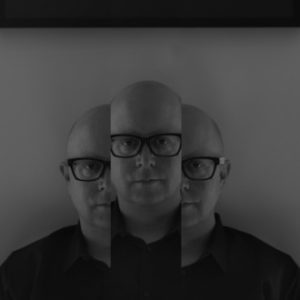 Tom Cardamone is the editor of Crashing Cathedrals: Edmund White by the Book and author of the Lambda Literary Award-winning novella, Green Thumb, as well as other works of fiction and non-fiction. You can read more about him and his writings at www.pumpkinteeth.net. And check out Crashing Cathedrals over at ITNA Press.
Tom Cardamone is the editor of Crashing Cathedrals: Edmund White by the Book and author of the Lambda Literary Award-winning novella, Green Thumb, as well as other works of fiction and non-fiction. You can read more about him and his writings at www.pumpkinteeth.net. And check out Crashing Cathedrals over at ITNA Press.
I met Tom years back when we were both tabling for Bold Strokes Books at the NYC Rainbow Book Fair. How far back? Meh. These days I’m lucky if I can answer that with an accurate range, but I’d say it would have to be somewhere between 2013 and 2015. A few years later, we joined up again at NYC’s inaugural queer comic-con Flame-con. And we hit it off and kept in touch. I’d read an anthology he edited: The Lavender Menace: Tales of Queer Villainy so I was already a fan. Then I read his novella Green Thumb and loved it, and I reviewed his erotic-fantasy The Lurid Sea for Queer Sci Fi.
Here’s the back cover blurb from Night Sweats.
Set in Japan, small town America, midnight Manhattan, ancient Greece and Rome, and beyond, these stories run the gamut of urban nightmare, gay love lost and found, dragons, super villains, a fairy addicted to meth, and Satan on the subway. Readers of Night Sweats will find tales that push boundaries while supplying ample scares, erotic thrills, much wonderment, and some woe.
So let’s dive in!
AP: Tom, you know I’ve been an admirer of your writing for some time. Big thanks for taking part in the Swap.
I loved Night Sweats. It left me with so many lasting images, from Cyclops babies to giant owls descending on small towns in New England to hallucinogenic fairy snot. I’ll get to some of your inspiration points and storytelling approaches, but I wanted to say off the bat, that quality of taking readers to places they haven’t been before is really present across the collection and pretty darn impressive.
I wanted to start though with more of an editing and production question. What was the process like for you selecting and ordering the stories? Slashed and Mashed was my first short story collection, so it got me intrigued about how other writers navigate that process, and maybe you could share with me and my visitors how you saw your stories fitting together as an anthology?
TC: Thank you for that outstanding introduction! I’ve enjoyed your work as well, and think Slashed and Mashed really covers some important ground, so congrats there! It’s one of those books that I wished had existed and been accessible in my youth.
To your question of story selection: years and years ago I read Nabokov’s Dozen, which featured thirteen of the maestro’s stories, and it’s stuck in my head that thirteen is the magic number. That said, I also pay attention to the flow, as if they were pieces of a quilt, and then the greater story tells itself, in terms of which one belongs at the beginning, the middle, the end and so on.
Also, and I think this applies to other writers as well, there are always pieces that are interesting but maybe experimental, too short or too weird to find a home anywhere else but in a collection of your work, where the consistency of your voice gives them buoyancy and permanency, so I’ve always written stories that I’ve never tried to place, but just crossed my fingers and thought “If I ever cobble together another collection, I know right where I’m going to plant this dark little seed. . .”
AP: That’s a great point. I’ve got some dark little seeds myself.
There’s a lot to love about your collection, and related to that topic of theme and subject, I’ve read two of your longer books, which were both on the dark and gritty side. With Night Sweats, you certainly included stories in that vein with characters on the margins like “Honeysuckle” and taboo orgiastic adventures like “Diabolical” and “Halloween Parade.” If I’m remembering correctly, there’s just one love story with a heartwarming, happy ending: “Blue Seaweed,” which I suspect was a germination point for your longer work about Nerites by the way, no?
TC: “Blue Seaweed” reflects my obsession with ancient history and myth, a fascination we share! This story, about a Greek boy during the time of the Roman Empire who meets a Godling from the sea and sparks fly, underwater as it were -this was one that gestated over a long period of time, and benefited from early readers, something I rarely do, but I did want love to win with this one.
AP: Nice. I’ve mentioned with regard to Green Thumb, your writing reminds me of William S. Burroughs in its hallucinogenic lyricism (or lyrical hallucinogenics?), and your work explores similar themes about the gay experience like lust and desperation and cruelty and loneliness and jealousy. Those were major themes from gay writers of the 1960s, 1970s, and 1980s. I’m thinking of John Rechy, Edmund White, and Paul Rogers whose work I devoured in high school and college.
I’m great at long, meandering lead-ins to questions, and I also have a tendency to wrap up several of them together. Who do you see as your influences?
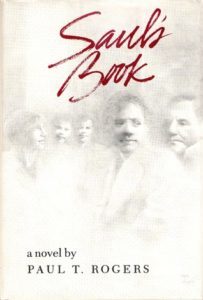 TC: Well thank you for the awesome Burroughs comparison, I’ve certainly read most of his work. And you’ve certainly hit upon some of my major influences. It’s very nice to hear Paul Rogers get name-checked. His lone novel, Saul’s Book, is astounding, more so once you learn he was murdered by his lover and adopted son shortly after publication.
TC: Well thank you for the awesome Burroughs comparison, I’ve certainly read most of his work. And you’ve certainly hit upon some of my major influences. It’s very nice to hear Paul Rogers get name-checked. His lone novel, Saul’s Book, is astounding, more so once you learn he was murdered by his lover and adopted son shortly after publication.
Another writer I admire, Paul Russell, wrote about him in a book I edited: The Lost Library: Gay Fiction Rediscovered. Other writers who have influenced me, especially early on, are Kathe Koja, Octavia E. Butler, Geoff Ryman and John Varley. Stylistically and the breadths and depths of their imaginations leave me breathless, which is what I hope some of my readers feel as well. The gay writers that you referenced, along with Saint Genet, are definite influences as well.
AP: I’m ashamed to say I’m only familiar with Geoff Ryman and Genet, but I can see the connection in both cases. There’s a haunting sadness in a lot of Geoff Ryman’s work and Jean Genet of course was provocative and unapologetic in his approach to sexuality.
I mentioned before I sensed some of the stories fed into your longer work. “Blue Seaweed” and “The Love of the Emperor is Divine” reminded me of The Lurid Sea for different reasons. I also got hints of Green Thumb here and there, not the post-apocalyptic setting but from your depiction of anthropomorphic characters and the eroticization of the unusual and from the tone of death and desperation. All of which makes for great, high impact reading by the way.
I don’t write short fiction nearly as much as you do, but I did have the experience of some of my shorter work leading into writing a novel. Around the time I wrote “Theseus and the Minotaur” from Slashed and Mashed, I wrote an experimental piece about Telemachus from The Odyssey and another based on the Nerites myth. It hit me later: hmm, what would happen if these four gay boys met up and had an adventure? That turned into a YA buddy comedy I’m currently pitching around.
Do you find that your shorter work stimulates an interest in writing longer pieces? I know you write both, and I’m curious if you find yourself more at home with short versus long?
TC: Confession: I write short fiction mostly to avoid novel-length projects, so I can feel productive while still dragging my feet.
AP: Alrighty. I’ll step back from that one.
Back to the fantasy subject, I recognized little reference points here and there — Greek/Roman sea godlings in “Blue Seaweed” and the superhero/super villain theme in “The Ice King” and “Kid Cyclops” — but there’s a lot of originality with the characters and situations. You have a spectacular imagination.
A common thread is alienation and the line between beauty/desire and the grotesque/repulsive. I mean, you have two stories with men fellating a pretty gory, reptilian devil. “Halloween Parade” concerns a guy looking to have sex with Michael Myers. Here comes my deep question, what do you think your choices of subject and I guess I’d say aesthetic have to say about your worldview and/or just your own experience in the world?
TC: I think it’s my commitment to going in a different direction, to figure out what we avoid talking about and having a full discussion right there, no matter how uncomfortable the subject matter.
AP: Interesting. I think that’s what makes your work high impact for me as I said. It’s confrontational, and whether or not you like the characters or the situations, they stay with you because they make you stop and think.
I have to confess, I used to read gay short fiction regularly, but that was before I hatched the great idea to start plodding through writing novels about ten or so years back. So I’ll share some of the short fiction writers I admire, but I bet you’ll be much more up to date than me.
I like Sam J. Miller, Victor Banis, Lawrence Schimel, Scott Hess, and Charlie Vazquez to name a few. Back in the day, I was a big fan of the queer fantasy journal Collective Fallout, which sadly folded in 2013. This year, I reviewed a similar anthology Broken Metropolis, edited by Dave Ring, and it was fabulous and made me appreciate the next generation of up and coming queer writers.
What short fiction writers are you reading these days?
TC: You mentioned some great names! Sam’s in The Lost Library, and Charlie wrote a great piece for a book I’ve recently edited: Crashing Cathedrals: Edmund White by the Book, which is a celebration of Ed’s work, book by book; his oeuvre is seminal, beyond impressive, it’s historical, and putting that together was an adventure.
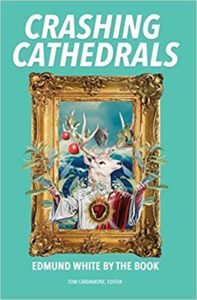 I’m currently reading Trebor Healey’s latest short story collection, Falling, and I love it. It’s astounding how stories that are thematically linked can also be so diverse yet well-drawn. And Craig Gidney is a favorite of mine. I interviewed him about his collection Skin Deep Magic a few years ago, and definitely recommend it as well as his first collection, Sea, Swallow Me and Other Stories. Both are stellar, fans of Tanith Lee will be impressed, and gay boys will see a multitude of reflections in his work that are otherwise hard to find.
I’m currently reading Trebor Healey’s latest short story collection, Falling, and I love it. It’s astounding how stories that are thematically linked can also be so diverse yet well-drawn. And Craig Gidney is a favorite of mine. I interviewed him about his collection Skin Deep Magic a few years ago, and definitely recommend it as well as his first collection, Sea, Swallow Me and Other Stories. Both are stellar, fans of Tanith Lee will be impressed, and gay boys will see a multitude of reflections in his work that are otherwise hard to find.
As you’ve recognized the influence of 80s and 90s gay writers, I must say that I did not know Andrew Holleran had a short story collection, he’s so known as a novelist that this escaped my attention, but earlier this year a friend recommended his book, In September the Light Changes, from 1999. I found a perfect hardback at the Strand and devoured it. So of those times yet timeless.
AP: Great suggestions! Both Healey and Gidney have been on my TBR list for too long. I’m bumping them up per your testimonials.
Onto another topic, the two of us have talked about the state of the gay publishing before, most recently over drinks perhaps to numb the pain. Like me, you’ve bounced around a bit in terms of publishers, and we’ve chatted about the joys and discontents of the changing market and the limited reach of the few remaining small presses for gay fiction versus m/m romance. Perhaps you could share your view based on your experience?
TC: Let me turn that around and reposition it as advice for an up and coming writer: decide now if you’re a commercial artist or an outsider. I knew early on I was in this for the story, and the stories I was going to tell would be from the margins, for the margins. So if you choose the latter, be prepared to do a lot of the heavy lifting, and know that you’ll be genuinely proud when you break new ground, but when you do break new ground, it will be midnight in a wet cemetery and you’ll probably be alone.
AP: Egad. Too true. Well, I do see your point. I think I mentioned this to you before, it’s a sad reckoning that even queer books that garner acclaim through programs like Lambda’s annual awards program often only achieve a small readership.
My last Swap with fantasy author J.P. Jackson got me thinking about how my writing has, and hasn’t, changed over the years. I could go back to what I wrote in grade school as an extreme example, and even though the kind of hack jobs I did back then were pretty hysterically awful, I can recognize some similarities in the way I approached character even those many years ago.
On the other hand, since I started writing with the goal of getting published, I have noticed that my interests have changed a little. My early work was quite serious in tone, and I mentioned my latest work is a buddy-comedy and overall, I’ve been drawn to writing humor more.
Do you find different inspiration points since your first short fiction pieces came out? I’ll attribute my switch to lighter stories as something of a safe zone in which to write about my observations of the world and perhaps, just perhaps as I get older I’m learning to not take myself so seriously. Do you think getting older has influenced your writing?
TC: Aging has had a huge impact on my writing because it has deeply affected my reading. I’ve always read one author biography a year, just to sharpen my literary interests and see what else I can learn about the craft. At some point, during the last ten years, my interest in nonfiction has really perked up. I struggle to finish a novel but can consume a biography in just days. Something inside of me is hungry for the truth, not that fiction doesn’t often lead there, sometimes profoundly so, but I’ve felt for a long time that so much of our history remains untold, uncovered, so that as my readings take me in that direction, I see my writing following that same compass.
AP: I’ve noticed you’re editing and writing nonfiction lately. Selfishly, I hope you’ll return to fiction down the line. What are you writing these days? Do you have upcoming projects?
TC: I’m working on a true crime piece to see if it grows into a book, so stay tuned.
AP: Awesome. Anything else you’d like to say you wish I’d asked? 
November 22, 2019
I’m back on WROTE!
MEDIA ALERT! I sat down with Vance and Baz to talk about Slashed and Mashed, mythology, diversity in queer lit, cultural appropriation and a whole bunch of other things. Those two guys run an amazing podcast, which is now up to episode 243. Pretty darn impressive. They both have an awesome sense of humor too.
So take a listen either at their website or better yet subscribe to their show on Apple Podcasts or iHeart Radio or wherever you listen to ‘casts. If you read LGBTQ+ fiction, you’ll likely find an interview with one of your favorite authors. And let me know what you think of my interview. 
November 13, 2019
Story excerpt from Slashed and Mashed
For #SlashedandMashed Release Week, I’m sharing some book extras. Today I thought I’d post an excerpt from the lead story in the collection “Theseus and the Minotaur.”
I wrote “Theseus and the Minotaur” almost two years ago when I was prepping to start my Patreon page and wanted to front-load some of the work providing content for patrons. I love Greek mythology, so a natural place for me to start was re-imagining classic myths and giving them a queer spin.
On re-familiarizing myself with the source material, a couple of things stood out to me and got my creative gears spinning. First, like most Greek heroes, Theseus was really young when he set off on his adventures. Greek writers and historians were pretty stingy in the area of development of character, and of course, they didn’t think about human development in the same way we do. But I was struck by the opportunity to flesh out Theseus as a young adult, just entering manhood as was said, which might have meant he was 18 years old or younger.
Then, even more so, I was drawn to redeem the tragic beast character the Minotaur, who like so many Greek monsters (e.g. Medusa, the Cyclops) had a cruel and haunting history and was spared no kindness, no humanity in the source material.
Last, I was struck by the relationship between Theseus and Ariadne. They’re both described as idealized beauties, and some versions of the story portray their relationship as romantic. But it’s not told as a triumphant romance like Perseus and Andromeda or a tragic romance like Jason and Medea. The myth writers were pretty wishy-washy about Theseus and Ariadne. One version has Theseus dropping Ariadne off at an island on his way back from Greece, for example, and in any event, it’s not described as a lasting relationship. Ariadne was linked to the god Dionysus by storytellers of the time for example. That got me thinking about who really captured Theseus’s fascination on his trip to Crete.
Anyway, here’s a short excerpt from my story when Theseus first meets the Minotaur in his quest to kill the monster of the labyrinth. My husband drew this sketch to go along with the story.
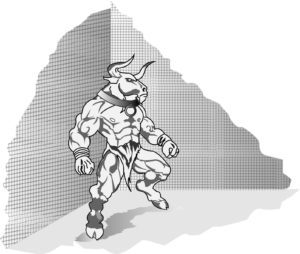
Slashed and Mashed
Andrew J. Peters © 2019
All Rights Reserved
THESEUS HELD HIMSELF silent for a moment. The dimensions of the chamber surely signified something, whether a pit lay in its center for him to trip into, or his trail had led him to the heart of the labyrinth. Casting his gaze here and there, he regretted he had so few markers with which to judge. But, oh yes, that looked like straw scattered on the ground, such as could make a kind of bedding. And, oh yes, a familiar scent traveled to his nostrils, which spoke of habitation, as a house held on to the peculiar smell of its occupants, bare feet upon the floorboards, odors seeped into leftover clothes and bedsheets. This scent he would describe as hide and the earthy smell of a man freshly woken from a night’s sleep. He stood on guard, thinking about how quickly he could wield his sword.
Now, faint breaths arose from the sightless depths of the chamber. Not slumbering breaths but more carefully measured, like a man (or creature?) concealing itself. Switching out the bobbin for his sword, he staggered forward a few paces, pointing his torch ahead of him.
“Show yourself and let us end this game.”
A daring vow that overplayed his true grit. For when a shadow rose from the floor, towering a head taller than he, and a murky silhouette lurched toward him, the prince could only hold his ground, transfixed by the adversary he had summoned.
Twisted horns sprouted from an impossibly broad and jutting forehead. The shoulder span and thickly muscled torso of a demigod. The creature was entirely bare from its bulging chest to its manhood to its thick, crushing thighs. Bowlegged by its anatomy, it walked upright with powerful strides.
“You’ve come to smite me?”
A further terror. It spoke. Yet in a voice more human than Theseus would have imagined. Deep and virile, as befitted its proportions. Theseus stared back at its black-eyed, challenging gaze. He could not produce a word.
The Minotaur curled its mouth. “If you are such an adventurer, I should like to know your name before you try your sword against me.”
Theseus threw back a foot, bent his knees in a defensive stance, and wielded his sword, one-handed at his shoulder. “I am Theseus of Attica. Son of Aegeus. Prince of Athens. Enemy of Crete.”
The Minotaur cocked its head slightly. A strange gesture for a man-eating monster. Though its horns, its size, its physicality spoke of dominance and destruction, it did not seem to be tensed for battle.
“What is Attica?” it said.
“A land far from here. Across the Aegean Sea.” Theseus elaborated no further. Curious as it was that the man-bull wished to talk, he had not come for conversation. His gaze passed over the leather collar around the creature’s neck, and he breathed courage into
his lungs.
“Your father declared war on us. As did your god. I have come to end it.”
He rushed at the monster with his blade outstretched, ready to hack. For a moment, he thought he had caught his enemy off guard. Then, in a blur, the Minotaur struck out and caught his sword arm in its hand with an impossible strength.
Theseus fought to free himself, and then the hilt of his blade slipped from his hand, and his only weapon clanged on the floor behind him. The monster held him in an iron grip. He twisted the prince’s arm and shoved him back. Theseus barely managed to stay on his two legs and not drop his torch.
No sooner had he raised his eyes than the creature came at him again. Now, he looked distinctly peeved. (And the Minotaur was no longer “it” in the prince’s head. Theseus had expected to fight a creature more beast than man. He found instead an adversary with human intelligence, the capacity to speak, composed of human flesh but for twisted horns and hooves. “It” was “he.”)
“What do you know of my father? What do you know of my god?”
Theseus pivoted around, anticipating a strike, unable to take his eyes off his challenger in favor of searching for his blade, which he desperately needed.
The Minotaur rounded him. “Speak. You’ve come a long way to tell me about my origins. Would you stop now?”
“Your stepfather, I meant,” Theseus said. “The King. He is my enemy. As are you.”
The Minotaur snorted. “Yes, stepfather. My warden. He is no father to me. Would a father keep his son in a cold, dark crypt, Prince Theseus?”
Theseus supposed it would not be so. Judging the space and the creature’s reach, he could see no opening for an attack—with only his bare hands? A spree to escape the creature was slightly more plausible.
“I will have justice,” Theseus snarled. “Your country has terrorized my people and driven us to starvation.”
The Minotaur’s eyes passed over the prince from foot to head. “You do not look so badly used, nor fed.”
“I have been chosen as my country’s champion.” Gods, his voice had cracked like a petulant boy. Theseus tried to shake it off. “Your father, I mean Minos, is a child murderer. If I do not succeed, Athens must send him fourteen children to enter the labyrinth.”
The beast took that in for a moment. “Children? Well, Minos is a master of cruelty. I do not answer for King Minos’s nature or his crimes.”
Theseus’s eyes flared. His impartial acquittal of the matter was vexing, seemed mocking. “Are you not the lord of this den?” Theseus waved his torch arm around. “Is this not your house? Your hunting ground?”
A mirthless smile came back at him. It was gone as quickly as it had appeared. Though it would be too much to say the prince regretted his words, he was in an instant aware he had unleashed a fury—to which he possessed no equal reprisal—from an opponent who stood much taller and broader than he, and had pointed horns.
The Minotaur overtook the space between them and railed, “Yes, I am your beast. Your Minotaur. Tremble before me as men have done since the day of my birth. Dread monster. Man-eater, they call me. Hated by all who behold my horns. Banished to this underworld lest women faint and children cry from the sight of me. Scourge of the earth, so foul it entraps men to dine on their bones. Are you not afraid, Prince Theseus?”
# # #
If that whets your appetite for more of the story, you can pick up the anthology here.
November 11, 2019
Yes, It’s release day for my very first short story anthology!
Seven gayly subverted stories from around the world in one neon pink-slashed collection.
Get into your comfies, set your cell on vibrate, and curl up with it on the surface of your choice. My preference is our living room sofa next to the radiator. Our cat Chloë likes that too.
Here’s what you can expect.
What really happened when Theseus met the Minotaur? How did demon-slaying Momotarō come to be raised by two daddies? Will Scheherazade’s hapless Ma’aruf ever find love and prosperity after his freeloading boyfriend kicks him out on the street? Classic lore gets a bold remodeling with stories from light-hearted and absurd, earnestly romantic, daring and adventurous, to darkly surreal.
The collection includes: Theseus and the Minotaur, Károly, Who Kept a Secret, The Peach Boy, The Vain Prince, The Jaguar of the Backward Glance, Ma’aruf the Street Vendor, and A Rabbit Grows in Brooklyn.
Award-winning fantasy author Andrew J. Peters (The City of Seven Gods) takes on classical mythology, Hungarian folklore, Japanese legend, The Arabian Nights, and more, in a collection of gayly subverted stories from around the world.
Sound all right? Pick up a copy for yourself at the NineStar webstore or Amazon or BN.com or iTunes, etc.
I’ll be sharing some behind the scenes scoop all this month, and for today, I thought I’d talk about a song that inspired the mood of the last story in the collection: “A Rabbit Grows in Brooklyn.”
It’s about a Puerto Rican guy in his late twenties who leaves his Pennsylvania hometown to move to New York City for a job as an assistant professor at a community college. He’s also dipping his toes into living his life as an openly gay man.
Then an encounter with a strange vagrant in the neighborhood leads to a series of mystifying and surreal events.
One of the story elements is that vagrant character Rabbit plays a haunting song on his beat up guitar that becomes a darkly romantic backdrop. I found it searching for Brazilian folk songs and fell in love with it. “Nesta Rua,” sometimes called “Se Esta Rua Fosse Minha” (“On This Street” or “If This Street Were Mine”) has been re-arranged and performed widely, but the original song writer is unknown. It’s a traditional Children’s rhyme or folk song. Anyway, give it a listen. What better version to share than openly gay songwriter and actor Jay Brannan playing it in Porto Alegre, Brazil.
Jay Brannan – my Brazilian debut (Nesta Rua)
jay attempts portuguese in his hotel room in porto alegre, brazil http://jaybrannan.com http://facebook.com/jaybrannan http://twitter.com/jaybrannan http://itunes.com/jaybrannan http://cdbaby.com/Artist/JayBrannan
September 10, 2019
Pop Up Swap with J.P. Jackson

Well lookie here. I’ve got another Pop Up Swap! This one is with fellow fantasy author and fellow NineStar Press author J.P. Jackson, who also goes by Jeff.
Here’s a bit about the guy.
J.P. Jackson works as an IT analyst in healthcare during the day, where if cornered he’d confess to casting spells to ensure clinicians actually use the electronic medical charting system he configures and implements.
 At night, however, the writing happens, where demons, witches, and shapeshifters congregate around the kitchen table and general chaos ensues. The insurance company refuses to accept any more claims of ‘acts of the un-god’, and his husband of almost 22 years has very firmly put his foot down on any further wraith summonings in the basement. And apparently, imps aren’t house-trainable. Occasionally the odd ghost or member of the Fae community stops in for a glass of wine and stories are exchanged. Although the husband doesn’t know it, the two Chihuahuas are in cahoots with the spell casting.
At night, however, the writing happens, where demons, witches, and shapeshifters congregate around the kitchen table and general chaos ensues. The insurance company refuses to accept any more claims of ‘acts of the un-god’, and his husband of almost 22 years has very firmly put his foot down on any further wraith summonings in the basement. And apparently, imps aren’t house-trainable. Occasionally the odd ghost or member of the Fae community stops in for a glass of wine and stories are exchanged. Although the husband doesn’t know it, the two Chihuahuas are in cahoots with the spell casting.
J.P.’s other hobbies include hybridizing African Violets (thanks to grandma), extensive traveling and believe it or not, knitting. For more about him and his writing, visit his website or his Facebook page.
Jeff and I met through the NineStar authors’ Facebook page. He’s a social media whirlwind, and I quickly became a fan of his posts sharing book marketing ideas as well as his super friendly personality. Then I saw one of his books was called Magic or Die, which on title alone hooked my interest.
To back up a bit for anyone new to the Pop Up Swap, it’s where I exchange books with another author and we interview each other. I told Jeff Magic or Die was on my TBR list and maybe he’d be interested in doing an exchange. He said: “Sure, why not?” and he’d be happy to take a look at my Werecat series [link forthcoming to that interview] and here we are. 
August 2, 2019
My interview at the Writescast Network
Hey folks! I spilled the news about my upcoming short story anthology to author R.R. Campbell on his Writescast podcast.
You’ll be hearing a lot more about that story collection. The title is Slashed and Mashed: Seven Gayly Subverted Stories and the release date is November 11, 2019. I haven’t talked much about it while it’s been working its way through production at NineStar Press, but I’ve been busy behind the scenes with the editing round.
Campbell gets the scoop on what it’s all about along with my experience with anthologies. He runs a great ‘cast on all aspects of being a writer, from plotting and character development to marketing and promotion.
Listen to my interview here.
June 25, 2019
Pop Up Swap is Back! With Author M.D. Neu!

The Pop Up Swap is back! Well, from so long ago, I’m probably the only person on earth who remembers it ever existed. So let me explain…
A couple years ago I had this marvelous idea to exchange manuscripts and dialogue with fellow authors whose work I admire, and who write in similar genres, and it would be a scintillating, fresh approach to the typical author interview one finds in the blogosphere. Plus it would provide an opportunity for my readers to get to know some of the authors in my life. Here’s my Pop Up with historical fiction author Elin Gregory, for example.
I called it a pop-up because I knew it could come and go quickly and be a bit unpredictable. Life happens, and I generally don’t have a ton of time to do big features here at my site. That most definitely proved to be true, but this year I found new motivation and some new friends who were willing to do the swap. Yee-haw!
So for the rebirth of the Pop Up Swap, I politely asked strong-armed fellow NineStar author M.D. Neu (Marvin) into reading each other’s work and interviewing each other based on that. He read Irresistible and you can find my interview with him here. A bit about M.D.…
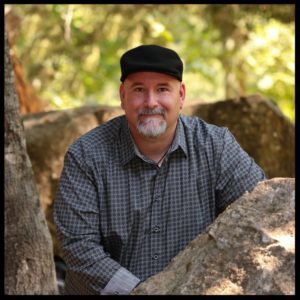
M.D. Neu is a LGBTQA fiction writer with a love for writing and travel. Living in the heart of Silicon Valley and growing up around technology, he’s always been fascinated with what could be. Specifically drawn to sci-fi and paranormal television and novels, M.D. Neu was inspired by the great Gene Roddenberry, George Lucas, Stephen King, Alice Walker, Alfred Hitchcock, Harvey Fierstein, Anne Rice, and Kim Stanley Robinson. An odd combination, but one that has influenced his writing.
Growing up in an accepting family as a gay man, he always wondered why there were never stories reflecting who he was. Constantly surrounded by characters that only reflected heterosexual society, M.D. Neu decided he wanted to change that. So, he took to writing, wanting to tell good stories that reflected our diverse world.
When M.D. Neu isn’t writing, he works for a nonprofit and travels with his biggest supporter and his harshest critic, Eric, his husband of nineteen plus years.
I had read and reviewed Marvin’s vampire novel The Calling for Queer Sci Fi about a year back, and we subsequently connected at NineStar’s author Facebook page as well as Twitter. I always enjoy getting to know fellow LGBTQA+ authors, especially the ones who write fantasy. Many thanks Marvin for letting me rope you into this! Oh, and here’s a link to my review of The Calling fyi.
And let’s get started!
AP: Hi Marvin! Thanks for taking part in the swap! I read your vampire story The Calling a little while back and really enjoyed it.
MN: Thank you for having me. I always enjoy chatting with fellow authors.
AP: I think I understand the appeal of gothic horror a bit as a writer, having written shifter fiction myself (Werecat). Besides it being a fun, atmospheric genre, it makes for an interesting milieu in which to tell gay stories because of the romantic themes, the hidden worlds, and the sense of ‘otherness.’
What drew you to writing a vampire story?
MN: For me it’s always been the ‘what if.’ I wanted to know if vampires were real how could they exist, especially in modern society were one viral video and it would be all over. Plus, I’ve always had a thing for vampires so I figured why not combine the two; my love of vampires and my wondering how they could exist today with all our technology.
AP: You have an interesting premise for vampire living in that it’s fairly approachable for the average person like your hero Duncan. There are ‘marks’ he must go through, and those are physically unpleasant for sure while his body goes through violent changes. But vampires have worked out a way to get blood without killing, making it more palatable with flavors like chocolate and cinnamon; and they’re involved in charitable causes, and they keep a lot of human traditions like celebrating Christmas. What would you say was your intention with that portrayal?
MN: Oh, I had a lot of fun with all that. The idea came back to the whole thing of how would they exist and operate in our modern society. It’s all about adapting or dying. The vampires in my world have learned humans don’t like being the bottom of the food chain, and they know if humans ever found out vampires were real, we humans would hunt vampires down and kill them. Despite all the vampire’s gifts, humans have the numbers and my vampires know it. So, the vampires have learned to play our games and live by our rules.
Remember, vampires in my world can’t just create anyone to be a vampire. They have to share a bond, and it’s part of the calling (the process of selection). Plus, my vampires were all human so why not keep the human traditions they know and like? Just because they are vampires doesn’t mean they don’t know how to have fun and enjoy life. It makes them more human, which I think they would need to be to survive, especially nowadays.
Now when it comes to working in charitable causes. That is just Juliet and Duncan. Not all of the vampires are that altruistic. Victor has many businesses he controls. Kirtus is a financial consultant and tax accountant who works a lot with both humans and Immortals. Other vampires have other jobs, and really that is born out of the need to live. They need money and ways to launder money so having jobs and owning companies gives them that ability. Again it all goes back to adapt or die.
AP: I thought you did an amazing job establishing Duncan’s voice, and it’s extra amazing because he’s not such a big personality or a snarky hero. He’d rather blend into the background, but I still found his forthright storytelling really engaging, and the fact he’s such an agreeable, non-presupposing kind of guy, you want to root for him.
Though there’s one thing he’s adamant about I found curious. He doesn’t like queer politics and makes the point a couple of times that gays should be “people first, not gay first.” Did you see that as a defensive position—not wanting to draw attention to his gayness—or is it a deeper part of his make-up—believing the only way forward for progress is for queer people to “act less queer?”
MN: I really wanted to go for an Everyman with Duncan. I wanted him to be your brother, your neighbor, your friend, or that stranger you see on the street that you don’t think twice about. That said, the point I try to make, not only with Duncan, but all my characters, is that queer people are more than their queerness. We are all people first with the queerness secondary. Why should it matter who any person loves or how they show their love? It shouldn’t. It also shouldn’t be the most interesting thing about them. I don’t see it as a defensive position, more of a general philosophy Duncan has. If that makes sense.
AP: So I want to follow up about “people first with the queerness secondary.” I did get that vibe from the book, and not just in the queer context. Since the vampires are literally in hiding and spending a lot of their time very carefully trying not to rock the boat with humans (the “light” vampires I mean, who are the primary focus), they’re also following that mantra in a sense.
[just a little vampire interlude]
MD: In the book, yes. The light vampires don’t really stir things up, and they are in a position where they don’t have too. It’s kind of the same with the Dark. They deal with humans and live with them, but humans don’t really factor into what is happening in their world unless it comes to being exposed. There is good motivation to stay hidden, they don’t want to cause a war which would end up killing a lot of people and the vampires wouldn’t win, at least they don’t believe they would win.
When my characters talk about being people first and whatever second it has to do with how they see the world. At one point Juliet asks Duncan why didn’t he tell her he was gay when they met. His response is ‘why does it matter? Would you have done or treated me any different?” When she says she wouldn’t, she realizes he’s right, she wouldn’t have done anything different so why does it matter to her? It’s a question and answer she hadn’t thought of and I think in the context of the story it makes a nice moment between the two of them.
What I want to show in the book is how ordinary being queer is. We talk about how we all want to be treated equal, so that is what I strive to portray in my stories. Unless it’s part of a character’s issues, queerness will be treated as ordinary and a non-issue. Showing one’s queerness is important to some people, but in my books the queerness comes second because it shouldn’t matter. If we want to live in an equal society then we need to look past what we see and focus on the contents of one’s character. That’s what’s important in my stories. You’re queer. GREAT! Yay! Now what? Can we have an adventure? I want to show the what happens after you know the character is queer. I want to show the adventure, not the coming out.
AP: I also like stories where the main character’s queerness is already established, and I found the focus on Duncan’s vampire trials refreshing. I read a lot of coming out stories and a lot of tortured queer stories when I was “new” to being gay in my twenties, and part of it is that—[cough], twenty some years later—my reading interests have changed. I’m more interested in how queer people navigate other kinds of situations, and I think of that as another dimension of positive representation.
You mention worldview being part of that decision to portray queer characters as “people first with their queerness secondary.” One of the reasons I was drawn to try out this author-interviews-author thing with you, is we have a lot in common, being white, married, gay men who write gay fantasy. Also, we both grew up in middle class families that were pretty supportive. I won’t call us “older men” – I turn 50 this year – but we’re both Gen Xers. Add to that, we both like fantasy that’s more adventure vs. fantasy being a context for exploring coming out or gay relationships.
Yet from your book, from this discussion, it’s interesting how we developed somewhat different worldviews. Like, I wouldn’t describe my writing as “people first, queerness secondary.” I don’t see a separation between the two or an ordering of those characteristics, i.e. don’t queer people have an essential ‘personhood’ already? Plus when you talk about character, that comes from myriad life experiences including queer experiences. For example, if I were writing my autobiography, I see lots of ways my queerness would be pretty essential to understanding who I am. Being married to a man is one obvious aspect, but my passion for social justice is another, as well as I’d say my curiosity about people who are different from me, choosing to live in a diverse, urban community over where I grew up, and my interest in traveling to an extent.
Even my development as a writer was linked to being queer in part. I started as a shy, withdrawn kid who escaped through writing fiction, and as an adult, while few of my stories are directly about overcoming queer oppression, I’m inspired by subverting heteronormative stories, reclaiming them for queer readers.
You talk about making queerness secondary as something of a message to queer people about equality. How do you think you arrived at your particular worldview concerning queer people?
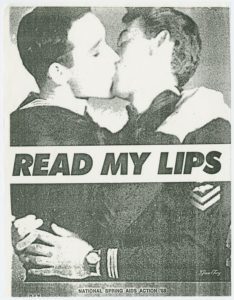
A little queer Gen Xer memorabilia.
MN: When it comes to how I was raised and my coming out, I was raised in a very conservative and moderately religious family. When I came out it was harder on me then it was for my family. They didn’t treat me any different and accepted me for who I am. As conservative and religious as my family is they judge people on character not on who they present to be, who they love, or how they show that love. Sadly, you can’t really say that to people because they don’t believe you. Because they have this belief that all conservatives are bigots. As an example my dad is very politically and socially conservative and yet he wanted to walk me and my husband down the aisle; a lot of people are shocked by that. Some don’t even believe me when I say it, but it’s true and important to me, and that’s why when I write it’s not overly important to represent whether you’re gay, conservative or whatever, it doesn’t really matter. What’s important is how you treat people.
In the case of my family they are people first and conservatives second… does that make sense?
So, that is the world I chose to write about and show. In my novel, it’s never about being queer. It’s about the adventure and the person. I’m not writing a coming out story. My novels and The Calling especially, is about a man who happens to be gay deciding to become a vampire and how that affects him as a person.
At the end of the day all I know for sure is that I treat people how I want to be treated and I think that is something we should all strive for. It is how I write my books, and it is how I tell my stories. I want the reader to have an adventure and enjoy, if it causes them to reflect on life and how they live it great. If it shines a bright light and society and affects change that would be amazing.
AP: Let’s turn back to your story then. How did you come up with the way the vampire world works? I recognized some of the conventions like mind control and the idea of vampire factions, but others were new to me. Did you use particular sources to develop that mythology and ‘world?’

Vampire image from Pixabay
MN: When it came to the world building, I studied traditional vampires, and I found they all had some baseline abilities so I started there. Then I dug into what additional powers and abilities they could have and pulled from there, which was a lot of fun. I also decided that vampires don’t reproduce in the way we’ve seen, they don’t get to just pick someone at random, there is more to it, much more, as we learn in the book. Further, I developed a set of rules for the vampire abilities and tried to keep them. For example, Juliet’s ability to calm people and alter mental states does take a toll on her. It causes her migraines. With Duncan his ability causes him headaches, and he gets tired. So, for each of the vampires they have a down side to their ability. It’s not major, but it’s there for all of them. It’s much more in the background and most people won’t even catch it. Especially since most of the vampires in my novel are older.
The mythology was much the same. I pulled from various sources and created my own. The over all goal was, again, how would they be alive now and what would a vampire community look like.
AP: The Calling ends with a host of possibilities for Duncan’s next adventure. Are you working on a follow-up?
MN: Oh yes. I have the sequel almost finished. Then I will start the editing process. The sequel picks up right were book one ends and we go from there. People will get to see just how imperfect all these beings are. The working title is The Called.
AP: How did you end up finding a home for your work at NineStar Press?
MN: Well, after sending out The Calling and getting various rejections, an author friend of mine sent me a message saying that his editor at NineStar was looking for novels from gay men. He asked if I had anything. As it happened a week prior, I had just sent in my manuscript for The Calling. He told me he would let his editor know, but no promises. About a month later I got an email from NineStar saying they wanted to publish my story. It was awesome.
AP: Very cool. I know that feeling. 



